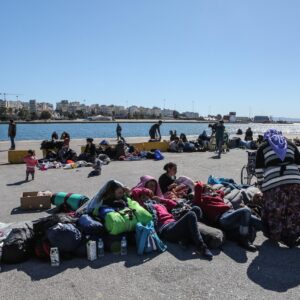Today’s European Parliament plenary vote on the EU Pact on Migration and Asylum marks the end of lengthy negotiations to reform the European rules on asylum. Caritas Europa is concerned about its potential negative impact on thousands of people’s lives, as the new rules clearly limit access to protection for those in need. Regretfully, the ...
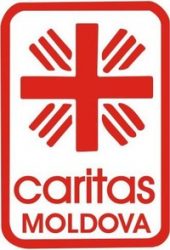
Address: str-la Sf. Gheorghe Asachi 30/1, MD-2028, Chisinau, Republic of Moldova
Telephone: +373 22 29 31 49 Fax: +373 22 29 31 49
Email: [email protected]
Facebook: Caritas-Moldova
www.caritas.md
Following the Republic of Moldova’s declaration of independence in 1991, the country witnessed a revival of religious life. Four years later, this renewal of faith served as an impetus for the Bishop of Chisinau to create Caritas Moldova to provide assistance to the poor and marginalised. At present, the main categories of Caritas Moldova’s beneficiaries include: homeless people, elderly people with insufficient means of subsistence, terminally ill patients or people with severe illnesses, children and young people, vulnerable families and one-parent families, socially isolated people, and other vulnerable categories. Caritas Moldova has relations with vocational schools, hospitals, kindergartens, prisons and other state social institutions. Through its activities, the mission contributes to poverty eradication and the establishment of equitable social systems, promoting values of tolerance and Christian mercy.
Caritas Moldova’s partnership with and support from international organisations and Caritas offices around the world has enabled it to expand the scope and scale of its humanitarian aid and social assistance programmes. Caritas Moldova’s activities began with simple distribution of humanitarian aid received from the West and evolved into complex and long-term projects. Together with national and international partners, Caritas has managed to set up projects that have become representative for the mission: medical-social centres, day centres for children from vulnerable families, canteens, night shelters for homeless people, parish social ministries, etc.
In 2004, Caritas Moldova revised its strategy against poverty by implementing a strategic pilot plan. Consequently, as of January 2005, it started implementation of its first three-year Strategic lan (2005–2007) in accordance with Caritas Europa standards. The first plan was followed by the Strategic Plan for 2008–2010 which aimed to achieve a number of goals, such as provision of assistance to groups of vulnerable people and social reintegration of poor and marginalised people.
Beside charitable projects and solidarity actions with persons in need, Caritas Moldova stood by those facing the consequences of a summer drought 2007, and also flood victims in July 2008.
In 2010, significant rainfall caused flooding in several regions in the north of the country, the worst affected being the villages of Nemteni, Obileni and Cotul Morii in the Hincesti district. In order to reduce the unfortunate consequences of floods and to improve the victims’ living conditions, Caritas Moldova implemented assistance projects, including: support to victims of summer floods in 2010 and rehabilitation of social infrastructure and support to affected families with supply of seeds and fodder after floods in the Hincesti district.
Through these projects, which were implemented with the generous support of a number of donors, 1680 families (4800 people) affected by the floods were assisted.
At the end of 2016, Caritas Moldova drew up its new Strategic Plan for 2017–2021. The new plan strengthens the main objective of Caritas Moldova’s mission, namely supporting deprived people, promoting social justice and defending human dignity with Christian charity.
Strategic courses of action and specific objectives include:
- Development of social services tailor-made for Caritas Moldova’s strategic courses of action (child protection and free access to education, helping the elderly in difficult situations as well as terminally ill people and the homeless).
- Development of internal mechanisms and structures for enhancing the work of the Caritas Moldova Charity Foundation, by training and consolidating the local branches where sustainable initiatives are present.
- Development of PR and fundraising teams to increase the number of financial sources in order to ensure the organisation’s sustainability.
Caritas Moldova is dedicated to consolidation of working capacities, development of the voluntary spirit, promotion of Christian charity, efficient cooperation with state authorities, etc.
Through its activities, Caritas urges the Christian community to be united with society and to demonstrate that all of us are a part of the same big family – daughters and sons of God with no one excluded.
Caritas Moldova operates within the territory of the Republic of Moldova through its National Bureau and eleven branches located in: Balti, Chisinau, Cretoaia, Grigorauca, Rascov, Ribnita, Slobozia Rascov, Stauceni, Tighina (Bender), Stircea and Tiraspol. Caritas Moldova’s branches are based in parishes, consisting of a local director (the parish priest of the community), a lay coordinator, employees and volunteers. At national level, Caritas Moldova consists of the President, the Caritas Moldova Council, a Censor and a Director. Caritas Moldova’s permanent staff include 110 employees and 150 permanent volunteers.
Caritas Moldova is a member of Caritas Internationalis and often collaborates and receives support from the global Caritas network, including Caritas Germany, Caritas Switzerland, Caritas Czech Republic, Caritas Austria, Caritas Vienna, Caritas Luxembourg, Caritas Poland, Caritas Romania, Caritas Italy and Catholic Relief Services.
Updates from Moldova
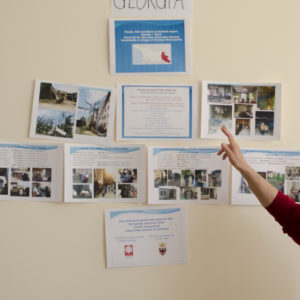
If I would be asked to give Caritas a human face, I would give it a woman’s face. We do not need to do a serious research to find out that the majority of care workers in Caritas are women. It is just visible! At the same time, research has shown that the majority of ...
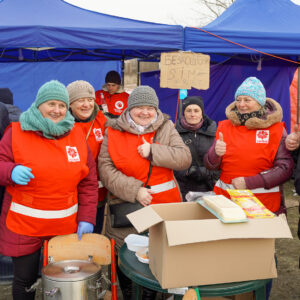
Two years after the beginning of the war and nearly a decade after the conflict in the east of the country, the humanitarian situation in Ukraine continues to deteriorate and will not improve if hostilities do not stop. This is the picture described by the two local Caritas organisations – Caritas Ukraine and Caritas-Spes Ukraine ...

Once upon a time, in a country where laughter mingled with tears and hope shone even in the darkest of times, there lived a little Ukrainian girl named Milana. Milana was a funny, pretty girl with sparkling eyes that held galaxies of curiosity and wonder. Her infectious laughter echoed through the corridors of the Caritas ...

This project, in the eastern Ukrainian city of Kharkiv, offers 800 children and an additional 200 parents from socially precarious and economically disadvantaged backgrounds help and support, in coping with everyday life every year and now more important than ever. At the beginning of the war, many of the project beneficiaries fled to other parts ...
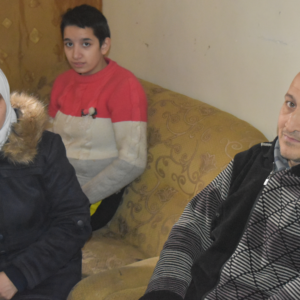
Yasmine Halalish lives in Aleppo with her husband, Fathi Moustafa, as the stepmother of three children: Raneem, who needs special health care, Tasneem and Mouhammad Moustafa. Their birth mother died. Please tell me about the time after the earthquake. Did you receive any aid? «We did receive aid from Caritas Syria: canned food, hygiene kits ...
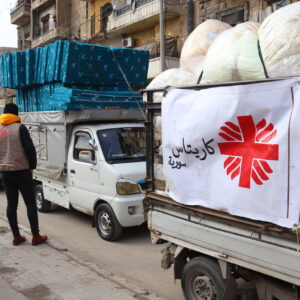
One year after a magnitude 7.8 earthquake hit Turkey and Syria on 6 February 2023, local Caritas organisations, supported by the entire Caritas network, continue to support the local population in dire need. In Turkey, the National Caritas, together with Caritas Anatolia, supported by Caritas Istanbul and Izmir, have been active from the first moments, ...
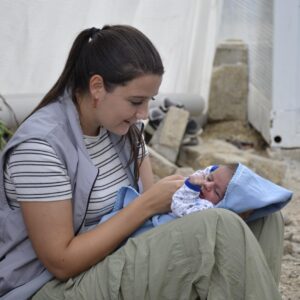
We could finally afford to live in the house of our dreams. It was outside the centre of Homs, the family home, big and spacious. After years of hard work as a teacher, my husband had saved enough money to renovate it. I was happy, finally our children would have enough space to grow up happy. ...
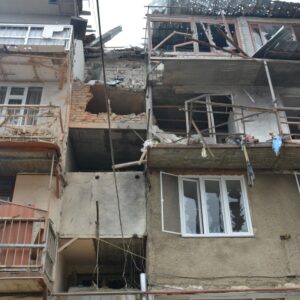
As the Armenian Caritas is already present near the border to assist evacuees leaving Nagorno-Karabakh, the international confederation mobilises funds and calls all parties to respect human rights. As of today, over 60,000 Armenians from Nagorno-Karabakh have fled to Armenia following a nine-month long blockade of the region and last week’s military intervention. Caritas Internationalis ...

Torrential rains that affected the area of Thessaly in Greece in early September lead to devastating consequences in all disaster-affected zones and villiages in Volos, Pilion, Trikala, Karditsa and in the Thessalia plain region. A week after the devastating floods, the amount of mud damage to thousands of homes and hundreds of businesses has increased ...
Caritas Europe Info
- Albania
- Andorra
- Armenia
- Austria
- Belgium
- Bosnia and Herzegovina
- Bulgaria
- Croatia
- Czech Republic
- Denmark
- England and Wales – CAFOD
- England and Wales – CSAN
- Estonia
- Finland
- France
- Georgia
- Germany
- Greece
- Hungary
- Iceland
- Ireland
- Italy
- Kosovo
- Latvia
- Lithuania
- Luxembourg
- Macedonia
- Malta
- Moldova
- Monaco
- Montenegro
- Netherlands
- Norway
- Poland
- Portugal
- Romania
- Russian Federation
- Scotland
- Serbia
- Slovakia
- Slovenia
- Spain
- Sweden
- Switzerland
- Turkey
- Ukraine
- Ukraine – SPES

